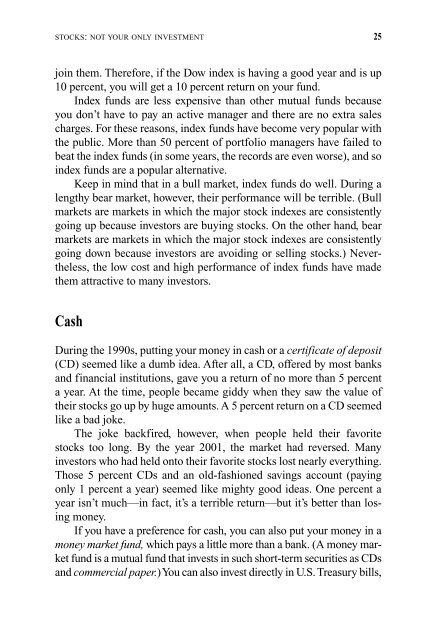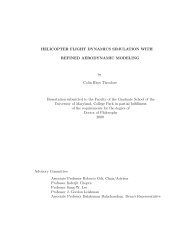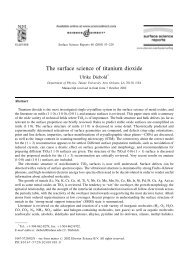Understanding Stocks
Understanding Stocks
Understanding Stocks
You also want an ePaper? Increase the reach of your titles
YUMPU automatically turns print PDFs into web optimized ePapers that Google loves.
STOCKS: NOT YOUR ONLY INVESTMENT 25<br />
join them. Therefore, if the Dow index is having a good year and is up<br />
10 percent, you will get a 10 percent return on your fund.<br />
Index funds are less expensive than other mutual funds because<br />
you don’t have to pay an active manager and there are no extra sales<br />
charges. For these reasons, index funds have become very popular with<br />
the public. More than 50 percent of portfolio managers have failed to<br />
beat the index funds (in some years, the records are even worse), and so<br />
index funds are a popular alternative.<br />
Keep in mind that in a bull market, index funds do well. During a<br />
lengthy bear market, however, their performance will be terrible. (Bull<br />
markets are markets in which the major stock indexes are consistently<br />
going up because investors are buying stocks. On the other hand, bear<br />
markets are markets in which the major stock indexes are consistently<br />
going down because investors are avoiding or selling stocks.) Nevertheless,<br />
the low cost and high performance of index funds have made<br />
them attractive to many investors.<br />
Cash<br />
During the 1990s, putting your money in cash or a certificate of deposit<br />
(CD) seemed like a dumb idea. After all, a CD, offered by most banks<br />
and financial institutions, gave you a return of no more than 5 percent<br />
a year. At the time, people became giddy when they saw the value of<br />
their stocks go up by huge amounts. A 5 percent return on a CD seemed<br />
like a bad joke.<br />
The joke backfired, however, when people held their favorite<br />
stocks too long. By the year 2001, the market had reversed. Many<br />
investors who had held onto their favorite stocks lost nearly everything.<br />
Those 5 percent CDs and an old-fashioned savings account (paying<br />
only 1 percent a year) seemed like mighty good ideas. One percent a<br />
year isn’t much—in fact, it’s a terrible return—but it’s better than losing<br />
money.<br />
If you have a preference for cash, you can also put your money in a<br />
money market fund, which pays a little more than a bank. (A money market<br />
fund is a mutual fund that invests in such short-term securities as CDs<br />
and commercial paper.) You can also invest directly in U.S. Treasury bills,

















